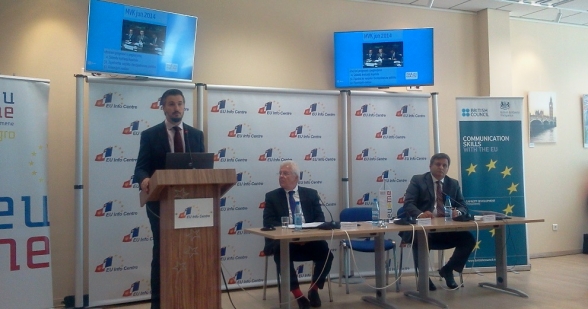To mark the second anniversary of the opening of accession negotiations, the Chief Negotiator's office for negotiations on Montenegro's accession to the European Union, the British Embassy and the British Council in Montenegro, organized the public debate on the topic "The second year of negotiations: Where are we now and what next?
As one of the panelists, keynote speech at the debate was delivered by the Chairman of the Committee on European Integration of the Parliament of Montenegro, Slaven Radunović, who pointed out that the success of the negotiations was not determined by the dynamics, i.e. their speed, but the quality of negotiations, which depended on the depth of reforms being carried out in the process of adopting European standards. He said he hoped that the focus of public and media would be brought back to the policy concerning European integration, for which there was a much higher degree of citizen support and that required thorough changes than the integration of others, which were the center of attention in the past. Pointing out that amendments to the Rules of Procedure of the Parliament of Montenegro from May 2012 and recent adoption of the Resolution on the way, the quality and the dynamic of the integration process of Montenegro to the European Union, substantially contributed to a better positioning of the Parliament in negotiations, Chairman Radunović indicated to specific aspects of the work of the Committee on European integration, reflected in the review of the negotiating position draft, organizing public debates and strengthening transparency of the negotiation process.
State Secretary for European Integration and Chief Negotiator, Aleksandar Andrija Pejović, presented the activities leading up to the decision on opening of negotiations with Montenegro, and the results that had been achieved in the last two years, which were reflected in the temporary closure of two negotiating chapters, and the trend of opening new ones. He pointed to the fact that the most demanding standards for opening negotiations were reflected wit chapters 11 - Agriculture and Rural Development, 12 - Food safety, veterinary and phytosanitary policy and 27 – Environment. Appreciating the past cooperation, Mr Pejović said that the Committee on European Integration was the key address for political support in the negotiation process, adding that this parliamentary body has grown into the pivot of reflection and evaluation of the negotiating team.
Participants of the discussion were also addressed by the British Ambassador to Montenegro, H.E Mr Ian E. Whitting, which encouraged further reform process in Montenegro, pointing to the fact that a new approach to negotiations was further developing, because as much as it represented the novelty to Montenegro, it was challenging for EU member states, and the European Commission as well. Ambassador Whitting agreed with previous speakers that the involvement and role of the Parliament in the negotiation process was the key element of democratic negotiation process, given the fact that members of the Parliament represented the voice of the citizens.








